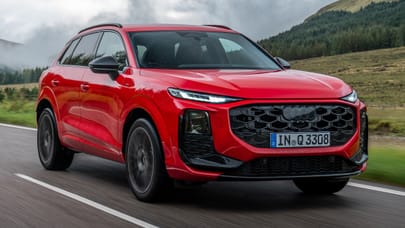
Top Gear’s top 10 city cars
You don’t drive up an Alp every day, after all. But at least with a few of these, it’ll still be fun when you do

Fiat 500

Of course we’re going to start here. The modern Fiat 500 is a city supremo in pretty much the exact way its forefather was in 1957 – by being a car that’s small, cheap and practical, yet one that doesn’t punish you for any of it. In fact, it’s quite the opposite.
Being small, lightweight and squarely proportioned create virtuous circles – the suspension doesn’t have to be rock-hard to control the mass of the car, the brakes can be smaller and lighter (which helps the suspension further), and regardless of powertrain – small petrols, electric power or indeed a mix of both – it never feels outdone outside the city limits, either.
Advertisement - Page continues belowCitroen Ami

Item two on the list and we’re already bending the rules.
But whether that’s a new Top Gear record or not is perhaps as irrelevant as the Ami’s demarcation as a ‘quadricycle’ – unless you’re a French teenager, obviously. It’s pretty much a car: doors that lock, a windscreen, accelerator and brake pedals, a steering wheel inside and four wheels outside. In fact, it’s so much like a car that you can drive it just like a car. But unlike any other car on this list, the Ami is purely for the city.
With a range of about 45 miles, it makes no sense to venture all that far outside metropolitan centres, but the Ami does make sense for the average British round-trip commute of less than 20 miles. Then, when you consider its 28mph top speed – and the average city commuting speed of 11mph – the Ami’s NCAP-dodging ‘quadricycle’ definition does seem a lot less serious. After all, would you rather crash a bicycle at 10mph, or something that’s pretty much a car?
Honda e

It’s an adorable, rear-drive Honda with a tremendously inviting interior and all the toys you could ask for. It has just enough pep to be a giggle to drive, handles better than you’d ever expect and manages what must be the tiniest turning circle this side of a Roomba.
The Honda e is – shockingly enough – also electric, which means any number of incentivising carrots and legislative sticks, depending on where you live. If you’re lucky enough to have a garage with a power point, you can raise two fingers to the entire petrochemical industry and drive for pennies on the pound. Which is great news, considering how many you’ll have to spend to buy one in the first place.
Advertisement - Page continues belowHyundai i10

It’ll never raise your pulse, profile or prospects with PYTs. But if there’s one thing that experience has taught us over the years, it’s to never discount a car picked out by a pensioner.
For all the japes and jibes about the cars chosen by OAPs, they’re reliably... well, some of the most reliable cars ever made. Toyota Camrys and Corollas, Honda Jazzes and... well, little Hyundai hatchbacks. Like the littlest i10, which manages to be as interesting as a church fete and seemingly as tailor-made for those in the autumn of their lives. But it’s also simple to drive, reliable and just about cheaper than walking. So it might be worth taking a lesson from the experienced...
Suzuki Ignis

City cars need nearly as much money to develop as bigger vehicles, yet the margins are absolutely tiny by comparison. So it’s hardly surprising to find the entire market broadly static – or even dwindling – and it’s just as little of a shock that quite a few cars in the segment focus on price, practicality and spec-sheet features first.
So to find the genre-hopping Ignis – a sub-tonne city car that’s also a four-seater, mild-hybrid 4x4 that’ll handle anything from city streets to frozen Swedish lakes – is enough breaths of fresh air at once to be in danger of hyperventilation.
Kia Picanto

At this end of the market, everyone knows what you’re after – wheels, with a warranty, without spending a wad of cash. And while it’s perhaps a bit lacking in emotion for car people like us, it is, by extension, much more rational.
So to find a car that doesn’t penalise you for your parsimonious approach, but instead rewards you with visual, tactile and on-road interest? That feels like having your cake, eating it and somehow also inheriting the bakery.
Toyota Aygo X

City cars, as we’ve mentioned, aren’t exactly money spinners. It’s not for nothing that the makers of successful city cars – Fiat, Volkswagen and so on – leave well enough alone once they’ve hit the mark.
So for Toyota to try to find and hit its own niche by transplanting the seemingly endless popularity of crossover SUV-type things to its little city car is understandable, if not particularly up our street. It’s a perfectly decent city car, as the Aygo/C1/108 always were, just now with another half inch of ride height to deal with... well, have you seen a city street these days?
Advertisement - Page continues belowFiat Panda

Yeah, we’re kind of amazed it’s still going, too.
Even though it’s more than a decade old (and is broadly the same as a two-decade-old car), even with its zero-star NCAP rating and even with the forced march towards electrification, the Panda’s still not extinct. But then the old, boxy, Giugiaro-designed one soldiered on for 23 years by itself, which does a fair job of explaining a) how right Fiat got the Panda back in the Eighties and again in the... um, Noughties, and b) just how stridently it adheres to the axiom ‘if it ain’t broke...’
If you can square yourself with its crash safety, it’s hard to find a city car that manages to be a better blend of fun and practicality. Or indeed one that’s less assuming or expensive.
Volkswagen Up

But if you were going to try to squeeze more fun (and more things) in less space, it has to be the Up. Or the ‘up!’ as only Volkswagen still insists on calling it. And, like the ‘new’ Panda, the Up has actually been around for more than a decade, yet remains one of the best choices for city cars in the face of newer and ostensibly better competition. It manages to be absurdly spacious, eminently practical and endearingly reliable. Yet it also manages to be genuine fun – at speeds you could generally keep pace with on a bicycle, too.
However, unlike the Panda, it earns a three-star NCAP safety rating. And that might be enough reason on its own to choose the VW.
Advertisement - Page continues belowCaterham 170

What do city cars really need? Easy: narrow width for city streets, small engines to save on fuel and tax and good visibility to not run into anything (or one). Scant weight to save even more fuel? Very welcome. Rationalising the controls and systems to only what you absolutely need? Great idea – less to break, less to get confused about. Delivering uproarious fun at every juncture, acting as a rolling reminder of everything that’s entertaining and rewarding about being in control of an automobile?
As for what city cars need to be? Well, generally hatchbacks... and also rather cheap. Which, at £28,990, might be stretching definitions to the point where the snapback could take someone’s eye out. On the other hand, when a new Honda e starts at £37,000, the Caterham feels like a bargain...
Trending this week
- Car Review
BMW iX3







